This article may contain affiliate links.
Updated: November 23, 2025
Vietnam is one of the most interesting countries in Southeast Asia, with landscapes that will captivate you in a very cheap country.
If you are planning travel to vietnam on your own, you are in the right place, I will tell you everything you need to know in advance so that you can prepare your trip well and have no setbacks.
Tips for traveling to Vietnam
1. Visa
Spanish people
Since August 2023, the Spanish We do not need a visa to travel to Vietnam, as long as The trip does not exceed 45 days.
Where to get a visa for Vietnam?
If you want to stay longer, you will need to apply for a visa which can be applied for electronically at the official website of the Vietnamese authorities of the link.
Other countries
The visa exception for Vietnam is for 13 countries, including Spain, several European and some Asian countries.
In case you are from Latin America, you will need to process the visa in the link I left you above or else contact the Vietnamese embassy where you live for more details.
Vietnam visa price
- 25 USD for a single entry visa
- 50 USD for multiple entry visa
In general, the single entry visa is for 30 days and the multiple entry visa is for 90 days, but you will have to look at how many days they are for your country.
👍 Friendly Tip: If you need to apply for a visa for Vietnam, I recommend doing it on the official website. If you search online you will find many pages that look official, but they are not and they charge more.

2. Entry requirements
The requirements for Spaniards to enter Vietnam are:
- passport with a minimum validity of 6 months upon entering Vietnam, and
- departure ticket which may be to a neighboring country.
👍 My two cents: when you travel to Vietnam or any other country, I recommend save a passport photo on your mobile and in the cloud (type Dropbox) or in the email. If your passport is stolen, it can get you out of trouble.
3. Vaccines for Vietnam
Mandatory vaccination
At the moment There is no mandatory vaccine to travel to Vietnam if you are from Spain.
But if you travel from a country where the yellow fever is endemic you will need to get vaccinated. At the moment, according to PAHO In most South American countries there is yellow fever, except in Chile and Uruguay.
So, if you are traveling from Spain, Mexico, Chile or Uruguay, you will not need the yellow fever vaccine.
Recommended vaccines
- Hepatitis A and B
- MMR (Measles, Mumps, Rubella)
- Typhoid fever
- Rabies, if you will be traveling to rural areas or coming into contact with animals
To get vaccinated you have to contact the international vaccination center where you live.
If you live in Spain, on this website Ministry of Health you can see where the nearest center is and here make an appointment online.
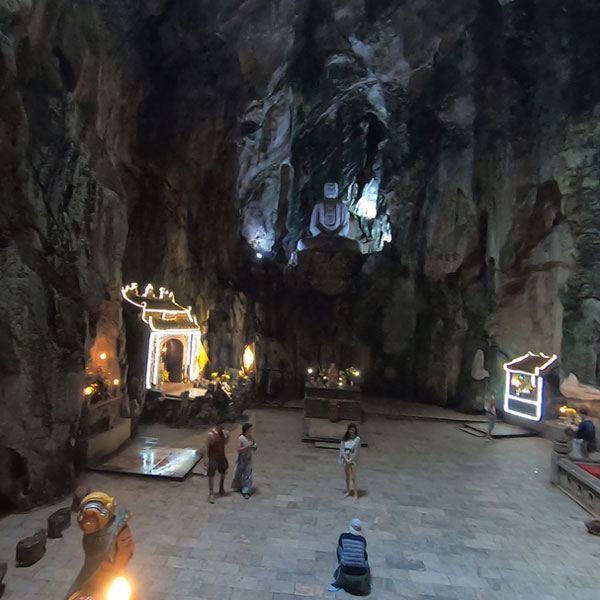
4. Travel insurance
Travel insurance is not mandatory for traveling to Vietnam, but it is recommended.
In case something happens to you, you can turn to insurance, otherwise not paying for any medical treatment out of pocket can cost you dearly.
As if that were not enough, the hospital equipment in Vietnam is very basic, if you will need a slightly complex treatment, they will transfer you to Bangkok or Singapore. Imagine what it could cost you. 😖
I always use and recommend Heymondo, an international insurance company that specializes in travel coverage. They offer excellent protection and 24-hour assistance, even with their basic plan. You can get a quote through this link — it already includes a 5% discount.
This insurance comes with top-notch medical care, repatriation services, and coverage for lost luggage, along with other perks.
Also, another good thing about this insurance is that if you have to go to the doctor during your trip you will not need to advance the money and then wait to get paid.
5. Safety
Broadly speaking, I can tell you that Vietnam is a safe country to travel to, but you should keep the following in mind:
- Nightlife: Be careful as you would in other places.
- Pickpocketing: In big cities, pickpocketing is common, keep an eye on your things, especially your cell phone, cards and passport.
- Robbery: they are increasingly common in big cities, so if you are not going to need your passport, it is better to leave it in the hotel safe or carry it in a travel fanny pack (I will tell you at the end of the article further).
If you were to be robbed in Vietnam and needed to file a police report, such as with a stolen passport, keep in mind that The police often have problems accepting theft complaints, you'll have to say it was a loss. Additionally, you will need to go with someone who speaks Vietnamese.

6. Scams in Vietnam
Yes, although it does not happen everywhere or always, there are scams, these are some of the most common:
- Taxi drivers: They don't put the taximeter on or they have it tricked.
- Vietnamese tricycles: since it is a Vietnamese transport, they usually play with this and try to charge very exaggerated prices, they can even give you a price without mentioning the currency, so it seems that they are talking about the Vietnamese dong when in reality they are referring to dollars.
- Advance price: Whether it's transportation, excursion or whatever, always negotiate the price beforehand.
- Check the change: It never happened to me, but I have heard from other travelers that they tried to trick them by giving them change.
- Fraudulent card charges: Always check that you are being charged the correct amount, many foreigners complain that they try to overcharge them when using the card.
- Very friendly people: Remember that nothing in life is free, if someone is very kind and offers to do something for you or take your photo, they will surely want to charge you later and they can become very aggressive.
- Day trips: be careful with excursions, In Vietnam it is safer to book online so you can read the reviews because there are many scams, then they do not fulfill what was promised, the quality is very bad and at the time of complaints those who do not understand English are made. This is quite common on excursions to Ha Long Bay, I also recommend some trusted excursions below.
7. Solo female traveler
Yes, Vietnam in general is a safe country for women, I traveled alone and had no problems.
But be careful as you would anywhere else, especially at night or in remote areas, because there have been cases of sexual assaults on foreign women, although they are rare.

8. Vietnam Must-Sees
If you are going to travel to Vietnam, it is worth visiting its main areas in the north, center and south of the country.
Here below you have a list with some of the essentials of Vietnam And I leave you the links to some excursions at a good price in case you want to take a look at them:
- North:
- Hanoi its capital;
- the Ha Long Bay unique in the world and a World Heritage Site UNESCO.
- Tam Coc with its landscapes and Hoa Lu the old capital; and
- the fabulous Sapa rice paddies and trails between mountains.
- Central:
- the imperial city of hue;
- the charming town of Hoi An; and
- he My Son Shrine, the three places declared World Heritage Sites.
- South:
- the city of Ho Chi Minh;
- the Cu Chi underground tunnels and the Mekong Delta;
- Phu Quoc island and its famous starfish beach.
Book excursions before or in Vietnam?
The advantage of booking excursions in advance is that once in Vietnam you will only dedicate yourself to enjoying, but that depends on your preferences.
In addition, by booking online you can see the comments of other travelers and thus avoid scams or unpleasant experiences.
Where are the best beaches in Vietnam?
The best beaches in Vietnam are in Phu Quoc, which are really spectacular, the rest of the Vietnamese beaches are good, but they are not the best beaches in Southeast Asia.
In fact, if you told me that you were looking for a beach destination to spend your vacation, I would tell you to choose another country.
What you can do is take a tour of all of Vietnam and end with a few days on the beach in Phu Quoc.
Trip to Vietnam and Cambodia
If you are going to travel to Vietnam, it is a good opportunity to take advantage of seeing Cambodia, at least to see Angkor Wat, which is the most important archaeological site in all of Southeast Asia.
You have the alternative of making the trip on your own, for that I recommend using this other site, that shows you all the transportation options with prices and you can book right there, so you avoid having to travel to buy tickets.
In case you don't want to worry about anything, you can make a organized trip Vietnam and Cambodia with everything included like the one in the link that is very popular and at a good price.
It is a circuit through both countries and includes the flight from Spain, internal flights, hotels, some meals, visits and guide in Spanish.
To enter Cambodia you will need to apply for a visa And if you cross through the land borders, keep in mind that the officers will ask you for a “tip” just to put the entry stamp on you.
Places to avoid in Vietnam
One of the most controversial topics in Southeast Asia is animal tourism.
What I can tell you is that the majority of places where they have animals suffer some degree of abuse and in Vietnam they are a little behind on this issue, there are even places that allow elephant riding.

Right off the bat, riding an elephant may not sound like abuse, however:
- Elephants' spines are not prepared to carry the weight of tourists behind them and those elephants end up with problems walking in a few years.
- For a tourist to be able to get on an elephant, a extremely hard training based on a lot of abuse, which always continues, if you look closely you will see the wounds behind the ears.
My recommendation is that avoid any type of activity with animals, even those that may seem harmless.
9. How many days to dedicate to Vietnam
To visit Vietnam You will need at least 13 days to see the essentials, 6 days for the north, 3 days in the center and 4 days in the south. Although, if you can dedicate more days to it, it will be better.
In case you are going to travel to Vietnam and Cambodia, then you should add at least 3 more days.
10. When to travel to Vietnam
The best time to travel to Vietnam is from December to March when it is the dry season, are good months to visit both the north, center and south of the country.
The only area that will not look as attractive during the dry season are the rice fields, which look prettier at the beginning of summer when they are very green.
Temperatures
As far as temperatures are concerned, the center and south of the country have a tropical climate, that is, heat all day and with high humidity during the rainy season.
On the other hand, in the north the temperatures drop a few degrees in winter, but they are still much higher than what we have in Spain.
But you can find yourself in Hanoi with minimum temperatures of about 15 degrees and in the mountains a little lower.
The coldest months in northern Vietnam are January and February.
To give you an idea, below you can see the annual average maximum and minimum temperatures of Hanoi.
Cheaper months
If you want to travel cheap to Vietnam, the best months are between May and November, which is the rainy season.
Chinese New Year
To decide when to go to Vietnam, keep in mind the Chinese New Year, which is widely celebrated in Vietnam, which was for 1,000 years a region of China.
New Year's shows can be very interesting to see; however, it is the most expensive time to travel to Vietnam.
The Chinese New Year changes dates because it is a lunar calendar and the celebrations usually last approximately a week.
For example, in 2024 it will be February 10, in 2025 on January 29 and in 2026 on February 17.
⭐ You may also be interested in this other article about 30 Curiosities of Vietnam with interesting facts about its history, gastronomy and culture.
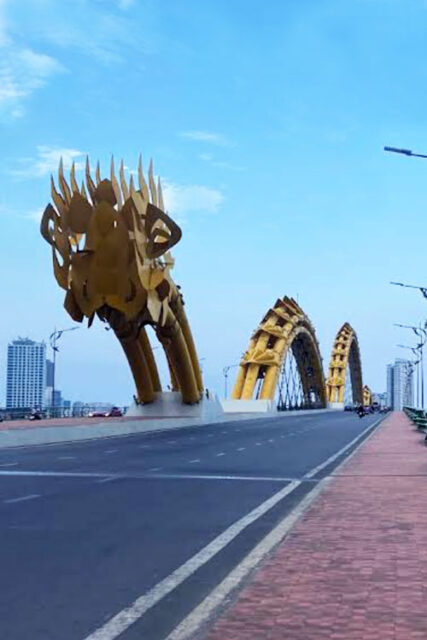
11. Money in Vietnam
The currency in Vietnam is vietnamese dong, which you will sometimes see as VND for its acronym in English.
To change money go to the exchange houses in the city, the ones at the airport will make you a worse change.
Although the best thing is that withdraw money from ATMs with a card like the one wise, without commissions or very low commissions and they give you the best exchange rate.
If you cannot withdraw money with your card, the bad thing is that Spanish banks usually charge very high commissions abroad.
Then, In many places in Vietnam you can pay by card, which is the best option to avoid paying commissions.
Although, it is normal that some stores charge you more if you pay by card and in those cases it will surely be better for you to pay in cash.
12. Language
The official language in Vietnam is Vietnamese.
Furthermore, in tourist places you will find people who speak English, although not everyone has a high level.
Then, in central Vietnam, I met many people who spoke French, mainly older people.
13. Mobile data
If you are going to travel independently to Vietnam, having data on your mobile is essential to be able to move around or make yourself understood by the locals, for that you have two alternatives: buy a local SIM or an eSIM.
Where to buy a SIM in Vietnam? What company?
To buy a Vietnamese SIM, it is best to go to the official stores in the city, to avoid any scam or the SIM not connecting later.
There are also many official stores in the airports, the bad thing is that they have expensive data plans, very focused on tourists.
The most popular mobile phone companies in Vietnam are Mobiphone, Vinaphone and Viettel, the latter is the one with the best coverage in the entire country.
eSIM for Vietnam
Another alternative is to buy this beforehand. eSIM for Vietnam that with that link you have a 5% discount and you have unlimited data.
The configuration is very simple, you do it before traveling and when you arrive you will have mobile data.
If you are going to travel to other Asian countries you can buy This other, which serves 11 countries, including Vietnam, Thailand, Cambodia, Indonesia and others.
Of course, check if it works for your mobile, because it does not work with some older models.

14. Plugs and power
The electric current in Vietnam is 220 V, the same as what we have in Spain, that's why You won't need a power converter.
As for the plugs, in the north they have the ones from two round plugs type C and F, equal to those of Spain.
Then in the south, the plugs are mainly for 2 or 3 flat pins type A and G, for that type of plugs you will need an adapter, as the one with the link.
In central Vietnam, I only came across round pin plugs, although you can sometimes find places that have flat plugs.
As they say that "a photo is worth a thousand words", below you can see the types of plugs I am talking about.
15. Prices in Vietnam
Vietnam is a very cheap country to travel to, to the point that at first when you arrive you are surprised by how cheap everything is, especially food and public transportation.
Then, everything that is more related to tourism (hotels, excursions and visits) can be a little more expensive, especially for local people, even so for us it is still cheap.
⭐ In this other article about Thailand or Vietnam Where to travel? I compare prices and other issues.
16. How to get around Vietnam
If you are going to visit Vietnam on your own you will not have problems getting around, because there are many options at very good prices.
To move long distances, for example, between the north, center and south of the country, the best are internal flights, which save a lot of time and are cheap.
Then, for shorter distances you have the option of move with trains to some places or else with buses.
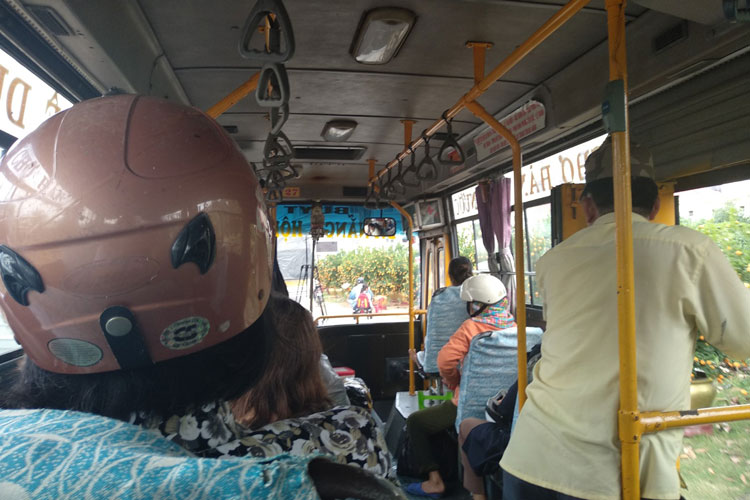
Finally, to move around the cities, you can do it with the local buses that are incredibly cheap.
👍 Friendly Tip: to know all the alternatives of transportation in vietnam I recommend this website, which shows you the schedules, prices and you can book the tickets right there.
⭐ If you are going to use public transport, it will be good for you to read this guide How to get around Vietnam: fast, comfortable and cheap.
17. Uber or similar
There is no Uber in Vietnam. The alternative is Grab, which works just like Uber and is very popular in Southeast Asia, and is also used to order food.
Another application to order a car Very popular among Vietnamese is Be.
18. Driving
One of the most striking things when arriving in the big Vietnamese cities is their chaotic traffic at full speed and honking their horns all the time.
So if you're wondering if it's a good idea to drive in Vietnam, I would say that in general no, unless you have experience driving in similar places.
Where driving could be a good option is in quieter or smaller towns, such as Hue, which is very good to visit by motorcycle.
19. Accommodations in Vietnam
Tourism in Vietnam is relatively recent and in hotels you can see that the standards are not too high in terms of quality or hygiene.
Therefore, I recommend the following:
- Read the comments of other travelers very carefully. before making a hotel reservation.
- Beware of accommodations that are too cheap, especially if you are staying in hostels, some have serious mold problems.
In these Booking links, you can see the offers for the best hotels in hanoi and here those of Ho Chi Minh, all with good opinions from travelers.
20. Tap water
No, In Vietnam tap water is not drinkable, that is why you will need to buy bottled water in any supermarket which will cost you very cheap.
If not, large hotels usually have filtered water available to their guests and it is safe to drink.
21. Vietnamese food
Vietnamese food is really delicious, with dishes that are very balanced in terms of flavors, where you can notice the great Chinese and French influence.
Therefore, it is normal to find dishes with wontons or the typical Chinese mooncakes.

Later, the French brought ingredients more used in Western cuisine such as cauliflower or onion, as well as baguettes, to Vietnamese cuisine.
If you are a lover of good food, you will love it. 😋
😋 Fun fact: Vietnamese cuisine seeks to enhance all the flavors that relate to the elements: sour – wood, bitter – fire, sweet – earth, spicy – metal and salty – water.
Is Vietnamese food spicy?
In general, Vietnamese food is not spicy.
Also, unlike other Southeast Asian countries when they use spiciness it is pepper, which is a more tolerable spiciness than peppers.
Among the different regions of the country, in the north, the food is spicier.
Is street food in Vietnam safe?
Yes, Vietnamese street food is safe and I recommend you try it because it is scrumptious.
👍 Friendly Tip: To choose the best food stalls, look at where the locals eat, it is always a guarantee of success.
Vietnamese dish to avoid
In the north of Vietnam there is a dish called Tiet Canh and it is a pudding that one of the main ingredients is blood, which can be duck or pork.
This plate It is very reminiscent of our blood sausages, with the difference that it is served in the form of a soup. Until then everything is normal, right?
The issue is that blood is not cooked and especially when it is pork. may have bacteria that cause severe infectionsTherefore, be careful about trying this dish.
22. Tips
In Vietnam, tipping is not mandatory, although it is common. when the service is to your liking, just as we do in Spain and most of Latin America.
The tip percentage that is usually left is between 10 and 15% or you can round the count to make it easier.
23. Shopping in Vietnam
If you want to bring original and typical things from your trip to Vietnam, I recommend the following things:
- Vietnamese hat: One of the most beautiful things you can buy is a traditional Vietnamese hat, these curious hats have more than 3,000 years of history and are used for rain and sun.
- silk garments: Vietnamese silk is of high quality and has a very good price.
- Coffee: Although it was introduced by the French in the 19th century, Vietnam is the world's second largest exporter of coffee and has a great coffee tradition.
- Hoi An Lanterns: They are beautiful, colorful and are perfect to take as gifts because they weigh very little.
- Ceramics: especially those from Bat Trang have an ancient tradition of high-quality ceramics.
- Tailor-made garments: This is one of the best things you can take, it is very cheap and you will have a garment that fits perfectly. The best place in Vietnam is Hoi An, where you will find many tailors who will let you choose the fabrics, take your measurements and the next day you will have the garment ready.

24. Bargaining
On your trip to Vietnam, always remember haggling at street stalls, but not in stores or shopping centers.
Then, if you are going to use any Vietnamese tricycle or a private transport, you must negotiate hard to get a good price.
Remember that if you don't haggle you will be paying much more than you should. 😉
25. Clothes for Vietnam (and shoes)
The clothes for Vietnam that I recommend you wear are light garments and breathable fabrics like cotton or linen.
Then, if you are going to travel during the Vietnamese winter to the north of the country, take warm clothes that you would wear in the spring or autumn in Spain. That is, wear some pants, closed shoes and socks, a thin sweater and a jacket.
You will also need to wear comfortable shoes, preferably versatile ones.
For me, the footwear that is most practical are the sports sandals type of hiking like the link (or you are a man).
These sandals are good for walking around the city, hiking to the rice fields, Ha Long Bay or the beach. They work for everything! ✌
26. How women dress
Vietnamese women dress like we do in the West, although sometimes you will see women dressed in traditional clothing, which are super pretty dresses.
So, on your trip to Vietnam, you can wear whatever you want. Just keep in mind that you will have to cover your shoulders and knees when entering places of worship (temples and churches) and this is for both men and women.
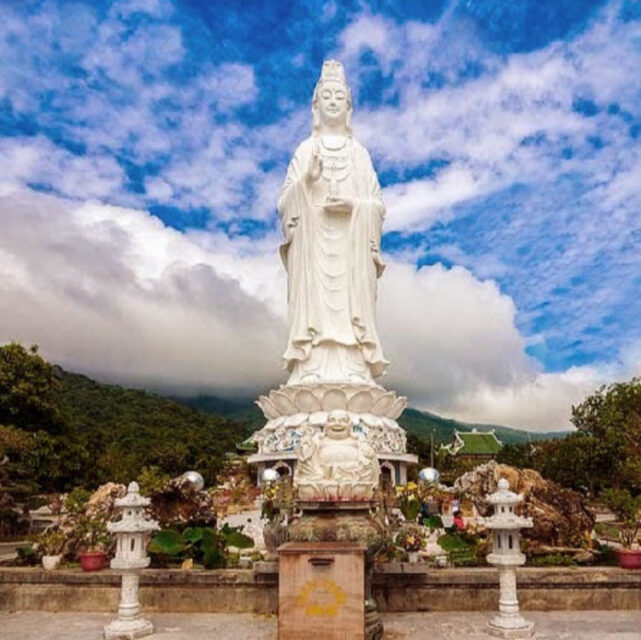
27. What to pack for Vietnam
- Sunscreen: In Vietnam they are expensive and often have toxic bleaching agents.
- Cap or hat
- Oilskin: like the one in the link that is not overwhelming and covers the backpack, it will be very useful if you travel during the rainy season
- Mosquito repellent: this is a must, in Southeast Asia I always use the Relec Extra Forte like the one in the link and so not a single mosquito comes near you 😅 A good repellent will keep you safe from dengue.
- Money belt: It is very practical to prevent the most important things such as your passport, cards and money from being stolen. This is the link It is very good, because it fits the passport and has RFID blocking so that no one can use your cards without your authorization.
⭐ You may also be interested in this other article about What to bring to Southeast Asia? – 47 Essentials in your Backpack.
Final Thoughts
These are my tips for traveling to Vietnam I hope they help you prepare your vacation.
If you want to read more, this Vietnam Travel Guide What I wrote may interest you, there you will find all my articles for traveling independently.
If you have any questions, leave me a comment below and I'll help you as much as I can. If you found the article useful, share it with other travelers. Have a good trip! 😘
More about Vietnam and Southeast Asia

Hi, I’m Andrea, creator and author of Viajeros Activos (Active Travelers). I write about Southeast Asia, the Caucasus, and Europe. I’m a full-time traveler, passionate about good food, and always looking for new adventures.


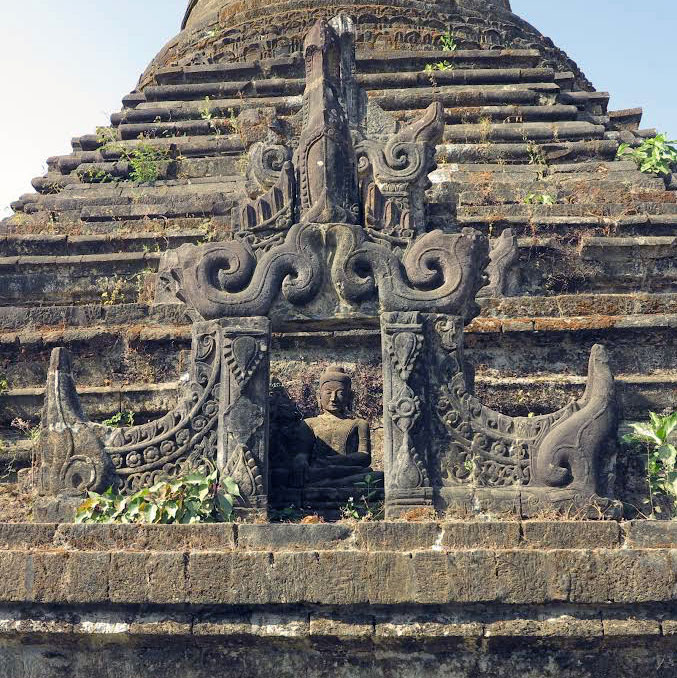
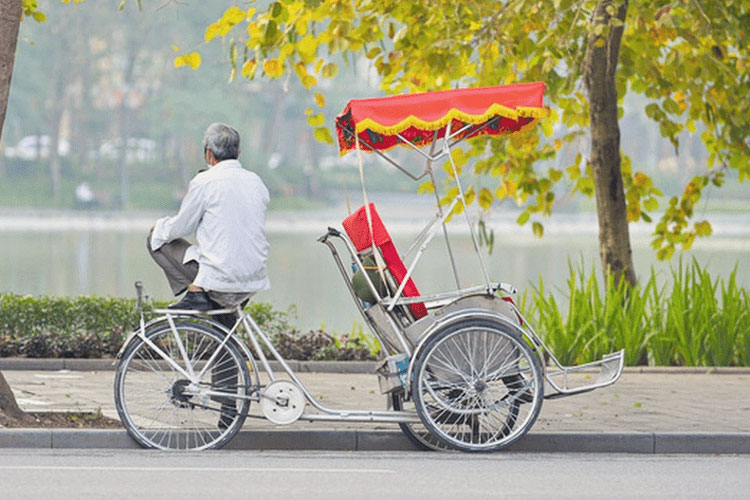
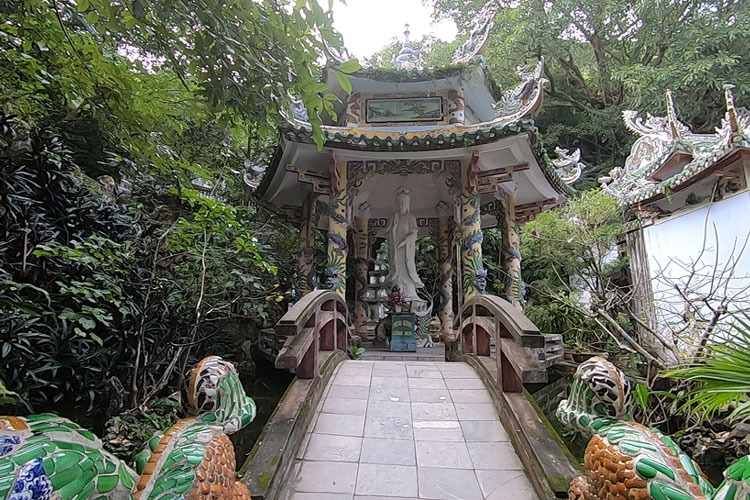


Thank you very much Andrea, such valuable information. 🙂
With this article you have encouraged me. The truth is I was undecided because it is the first time I have traveled alone to such a distant destination.
I wanted to ask you how safe night transportation is for a woman traveling alone in Vietnam?
Thanks for any additional information.
All the best
Hello Laura
I'm glad it encourages you, Vietnam is an incredible destination, you're going to love it!
Night transportation is safe in Vietnam and traveling alone you will have no problems.
I'm not going to deceive you, it is not a safe 100% country, we always have to take care of ourselves, but it is not more dangerous than Spain either.
Just have the care that you would have in other places.
Go easy and enjoy a lot!